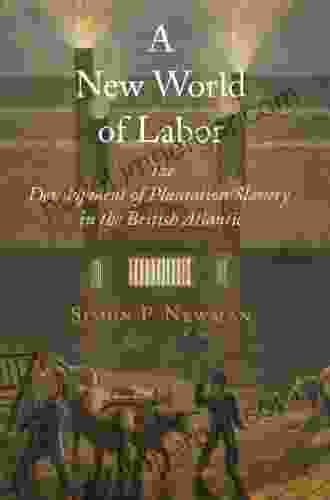Uncover the Origins and Evolution of Plantation Slavery in the British Atlantic: A Historical Journey


The institution of plantation slavery played a pivotal role in shaping the economic, social, and political landscape of the British Atlantic world. Beginning in the early modern era, the development of plantation slavery transformed societies on both sides of the ocean, leaving an enduring legacy that continues to resonate today.
4.6 out of 5
| Language | : | English |
| File size | : | 2921 KB |
| Text-to-Speech | : | Enabled |
| Screen Reader | : | Supported |
| Enhanced typesetting | : | Enabled |
| Word Wise | : | Enabled |
| Print length | : | 336 pages |
Early Antecedents: Labor Systems in the Atlantic
Before the rise of plantation slavery, various labor systems existed in the Atlantic, including:
- Native American enslavement: Indigenous populations in the Americas were enslaved by European colonists, particularly in the Spanish and Portuguese empires.
- Indentured servitude: Europeans under contract to work for a fixed period in exchange for passage to the New World, played a role in labor systems in the early colonial period.
- African enslavement: Enslavement of Africans had occurred in Europe and the Mediterranean for centuries, but its scale in the Atlantic increased dramatically with the development of plantations.
The Emergence of Plantation Slavery
The development of plantation slavery in the British Atlantic coincided with the rise of a sugar-based economy in the West Indies. Sugar, a highly profitable commodity, required extensive labor to cultivate and process. As indigenous populations declined and indentured servants proved inadequate, Europeans turned to enslaved Africans to supply the labor force for their sugar plantations.
The first English sugar plantations were established in the Caribbean in the 1640s. Over the following decades, they expanded rapidly, spreading to islands such as Jamaica, Barbados, and Nevis. These plantations were characterized by:
- Large-scale production of sugar
- Intensive use of enslaved African labor
- Harsher treatment and living conditions for enslaved workers
Economic Impact
Plantation slavery had a profound economic impact on the British Atlantic. Sugar became a major source of wealth for British merchants, planters, and investors. The profits generated from the slave trade and sugar production fueled economic growth in Britain and the Americas.
However, the economic benefits of plantation slavery were not evenly distributed. Enslaved Africans bore the brunt of the labor and endured harsh conditions, while plantation owners reaped the profits. The system created deep social and economic inequalities within colonial societies.
Social and Cultural Impact
Plantation slavery shaped social relations and cultural practices in the British Atlantic. The presence of enslaved Africans led to racial stratification and discrimination. Enslaved people developed distinct cultural forms, such as music, religion, and language, to cope with their oppression and maintain a sense of community.
Interracial relationships and mixed-race populations emerged, challenging traditional European notions of race and social hierarchy. Plantation slavery also influenced political institutions, as slave owners gained significant power and influence in colonial governments.
Resistance and Abolition
Despite the brutality of plantation slavery, enslaved Africans resisted oppression in various ways. They engaged in protests, work stoppages, and armed revolts. Resistance movements, such as the Haitian Revolution, helped to raise awareness of the horrors of slavery and contributed to its eventual abolition.
Abolitionist movements emerged in Britain and the Americas, advocating for the end of slavery on moral and humanitarian grounds. By the early 19th century, the British Parliament passed a series of laws to abolish the slave trade and eventually slavery itself in the British Empire.
Legacy and Impact
The legacy of plantation slavery in the British Atlantic is complex and multifaceted. It shaped the economic, social, and political development of societies on both sides of the Atlantic. The system left a lasting impact on race relations, cultural practices, and political institutions.
The abolition of slavery did not fully erase its legacy. Racism, inequality, and social divisions persisted in post-emancipation societies. The legacy of plantation slavery continues to inform debates about race, colonialism, and reparations.
The development of plantation slavery in the British Atlantic was a pivotal moment in world history. It transformed societies, impacted economies, and shaped cultural practices and political institutions. The legacy of slavery is still felt today, as we continue to grapple with its impact on race relations, social justice, and human rights.
By understanding the origins and evolution of plantation slavery, we gain a deeper appreciation of the historical forces that have shaped our world and the challenges and opportunities that lie ahead.
4.6 out of 5
| Language | : | English |
| File size | : | 2921 KB |
| Text-to-Speech | : | Enabled |
| Screen Reader | : | Supported |
| Enhanced typesetting | : | Enabled |
| Word Wise | : | Enabled |
| Print length | : | 336 pages |
Do you want to contribute by writing guest posts on this blog?
Please contact us and send us a resume of previous articles that you have written.
 Book
Book Novel
Novel Page
Page Chapter
Chapter Text
Text Story
Story Genre
Genre Reader
Reader Library
Library Paperback
Paperback E-book
E-book Magazine
Magazine Newspaper
Newspaper Paragraph
Paragraph Sentence
Sentence Bookmark
Bookmark Shelf
Shelf Glossary
Glossary Bibliography
Bibliography Foreword
Foreword Preface
Preface Synopsis
Synopsis Annotation
Annotation Footnote
Footnote Manuscript
Manuscript Scroll
Scroll Codex
Codex Tome
Tome Bestseller
Bestseller Classics
Classics Library card
Library card Narrative
Narrative Biography
Biography Autobiography
Autobiography Memoir
Memoir Reference
Reference Encyclopedia
Encyclopedia Robert Ellsberg
Robert Ellsberg Steve Wilkens
Steve Wilkens Zack Handlen
Zack Handlen Wilfrid Sellars
Wilfrid Sellars Shoneen Abbas
Shoneen Abbas Sam Mcgrath
Sam Mcgrath Russell Shorto
Russell Shorto Shannon Jean
Shannon Jean Robert Sherrod
Robert Sherrod Ronald Millar
Ronald Millar Robert Cope Md
Robert Cope Md Samuel Jay Keyser
Samuel Jay Keyser Tim Milne
Tim Milne Sanjeeb Behera
Sanjeeb Behera Sandy Jeffs
Sandy Jeffs Sergey Moskvin
Sergey Moskvin Stan Beecham
Stan Beecham Rick Makoujy
Rick Makoujy Robert Dallek
Robert Dallek Richard Mabey
Richard Mabey
Light bulbAdvertise smarter! Our strategic ad space ensures maximum exposure. Reserve your spot today!

 Nathan ReedThe Know Your Bill of Rights Book: Your Guide to the Fundamental Freedoms of...
Nathan ReedThe Know Your Bill of Rights Book: Your Guide to the Fundamental Freedoms of... Rob FosterFollow ·2k
Rob FosterFollow ·2k Kyle PowellFollow ·16.5k
Kyle PowellFollow ·16.5k Elias MitchellFollow ·8k
Elias MitchellFollow ·8k Nathan ReedFollow ·13.5k
Nathan ReedFollow ·13.5k Austin FordFollow ·14.3k
Austin FordFollow ·14.3k Earl WilliamsFollow ·9.6k
Earl WilliamsFollow ·9.6k Allan JamesFollow ·4.2k
Allan JamesFollow ·4.2k Gabriel BlairFollow ·17.2k
Gabriel BlairFollow ·17.2k

 Colt Simmons
Colt SimmonsLarge Collieries Iron Mines Stone Iron And Tinplate...
Step back in time and witness...

 Zachary Cox
Zachary CoxUnlocking the Secrets of Woody Plants: An In-Depth...
: Embark on a captivating journey into the...

 Yasunari Kawabata
Yasunari KawabataIntroducing 'Librarian Guide: 3rd Edition' – The Ultimate...
In the dynamic and ever-evolving...

 Jerome Blair
Jerome BlairEvading Honesty: A Masterful Exploration of Deceit and...
Prepare to be captivated...

 Timothy Ward
Timothy WardLove Is Real: A Novel of Love, Loss, and the Enduring...
Prepare to embark on a...
4.6 out of 5
| Language | : | English |
| File size | : | 2921 KB |
| Text-to-Speech | : | Enabled |
| Screen Reader | : | Supported |
| Enhanced typesetting | : | Enabled |
| Word Wise | : | Enabled |
| Print length | : | 336 pages |










